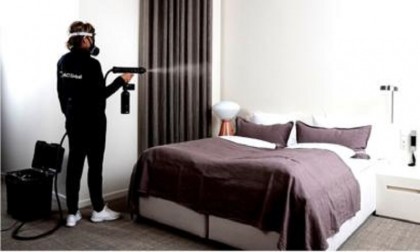Is coronavirus changing the world of cleaning?

- Update Time : Saturday, June 6, 2020
- 197 Time View

“Before, we had basic cleaning standards when handling luggage but sanitation was not a priority,” says Stasher’s co-founder and chief executive, Jacob Wedderburn-Day. “It absolutely will be now.”
The storage company uses spots such as hotel luggage rooms to stash bags – 300,000 bags have been stored over the last 12 months.
Before the coronavirus crisis hit, the business could expect between 500 and 1,500 transactions every day.
But Mr Wedderburn-Day doesn’t see numbers at that level happening until there’s a vaccine for Covid-19.
In the meantime, he is considering cleaning ideas that could reassure customers when they come back.
It’s an issue many businesses will face. Hotels, airlines, shops and restaurants will all want customers to be confident that their premises are as clean as possible.
“The virus is here to stay,” says virologist Byron Martina from Artemis One Health Research Foundation in the Netherlands.
“Normally, the longer a virus stays in the population the less aggressive it becomes. However, that may be a process of years,” he says.
“A virus is nothing more than the virus chromosome that is protected against the environment by a shield, and in some viruses, like the coronavirus, the shield is further surrounded by a fat layer (the membrane),” says Dr Martina.
That membrane can be dissolved by old-fashioned detergents. But customers, concerned about the coronavirus, might want an extra level of reassurance.
One option could be to make surfaces clean themselves.
Danish company ACT.Global sells a transparent coating that can be sprayed on surfaces and breaks down microbes. It reacts when illuminated and works with normal indoor light.
Coats last up to a year, but the effectiveness of this technology also rests on how much light is available – it’s not much good in dark places.
To work, the coating needs eight hours of light, roughly equivalent to that in a standard family living room.
“Let’s face it, travel will likely increase. And with it the risk that pathogens, once geographically contained, can rapidly spread. To rebound and restore confidence, measures have to be taken to protect against the risk of further pathogenic outbreaks,” says Christopher Lüscher, the chief technology officer at ACT.Global.
Other companies are hoping that ultraviolet (UV) radiation will prove to be an effective way of destroying viruses.
In particular the shortest wavelength, UVC, scrambles the DNA of organisms, killing them off.
The Solaris Lytbot uses far-UVC, an even shorter wavelength that is less harmful to humans and combines that with UVB and UVA rays that heat and cool and confuse pathogens.
The more problems pathogens face, the harder it is for them to survive.
The Lytbot runs in three or five-minute cycles, depending on the size of the space, and it remains stationary, although the company is looking to add autonomous navigation. The head moves 360 degrees to target surfaces.
But cleaning really big spaces, like sports stadiums, presents a bigger challenge.
Lucid Drone Technologies has adapted its drones to spray disinfectant and can cover up to 23,000 sq ft (2,140 sq m) an hour.
It is potentially a way to clean sports stadiums and the company says it is in talks with NFL teams.
Prior to the coronavirus outbreak, the drones were used for exterior cleaning of multi-storey buildings, a business that has slowed down.
Based in Charlotte, North Carolina, the company has built a dozen sanitation drones and has the ability to build 10 drones per week, says Lucid’s co-founder and chief executive Andrew Ashur.
Six cleaning companies have already signed deals to use the sanitation drones and the first batch are being delivered this month.
Mr Ashur says he has been asked about using his drones for dust suppression, cleaning and maintaining windmill turbines and water towers, and oddly enough, vulture repellent.
But professional cleaners are wary of hi-tech methods.
Richard Sticklee’s firm, Enviropure First Response, cleans up crime scenes and hazardous spills.
He says nothing beats the human touch for professional cleaning. While drone cleaning and hi-tech sprays can help with larger spaces, Mr Sticklee says being experienced, knowledgeable and trained on how to disinfect is essential.
And he points out that soap and hot water is the best way to get rid of the virus.
But for many companies the lockdown has either put a dent in sales or wiped them out altogether and that could curtail any investment in hi-tech cleaning.
“Profitability is of way more importance than growth for us in the next year,” says Jacob Wedderburn-Day of Stasher, noting that the company has been “ruthless” about cutting costs.
“When you get hit by a bus running a marathon, you don’t get up and worry about winning. You go to the hospital and run again next year,” he says.















